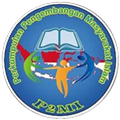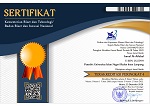INCREASING MADRASAH STUDENTS' LEARNING INTEREST AND UTILIZATION OF NAGARI-BASED LIBRARY INFORMATION SERVICES: COMMUNITY STRATEGY
Abstract
The problem in this study is how to increase student's interest in learning after being given information services at MAN Sawahlunto. The purpose of this study was to increase students' interest in learning classes XII A and XII S at MAN Sawahlunto in a better direction through the implementation of information services. The research method used in this research is Action Research, where the author is the implementer of Information Services and the homeroom teacher of class XII A and XII S MAN Sawahlunto is an observer of information services provided to students who have a lack of interest in learning. The condition of students' interest in learning before being given action is that there are still many students who do not pay attention to the teacher who is giving subject matter, cheat, and daydream until they make noise during the teaching and learning process. In addition, students lack interest in learning. The results obtained in cycle I show that student interest in learning has not increased evenly because there are still students who have an interest in learning in the low and very low categories. In cycle II, students' interest in learning still did not increase evenly because there were still students who had an interest in learning in the low category. The results of cycle III research are very good compared to the previous cycle because, in this cycle, the average student interest in learning has increased, and there are no students in the low category who have an interest in learning. The increase in student interest in learning and the learning process can be seen in the attitude of students toward learning and their activeness in the classroom. because there has been an increase in student interest in learning, this research is only held three cycles.
Keywords
Full Text:
PDFReferences
Abdurrahman, Abdurrahman, Yusuf Hadijaya, and Muhammad Latif Sipahutar. “Implementation Of Group Guidance Program Management in Improving Cooperation Learning.” Nidhomul Haq: Jurnal Manajemen Pendidikan Islam 6, no. 3 (2021): 548–58.
Alam, Ashraf. “Investigating Sustainable Education and Positive Psychology Interventions in Schools towards Achievement of Sustainable Happiness and Wellbeing for 21st Century Pedagogy and Curriculum.” ECS Transactions 107, no. 1 (2022): 19481.
Almusharraf, Norah, and Shabir Khahro. “Students Satisfaction with Online Learning Experiences during the COVID-19 Pandemic.” International Journal of Emerging Technologies in Learning (IJET) 15, no. 21 (2020): 246–67.
Ara, Shaheen. “Use of Songs, Rhymes and Games in Teaching English to Young Learners in Bangladesh.” Dhaka University Journal of Linguistics 2, no. 3 (2009): 161–72.
Bebasari, Mardiani, Nurhizrah Gistituati, and Mega Iswari Biran. “The Role Of Guidance and Counseling Information Services Through Interprofessional Education.” Bisma The Journal of Counseling 6, no. 3 (2022).
Bottrell, Dorothy. “Dealing with Disadvantage: Resilience and the Social Capital of Young People’s Networks.” Youth & Society 40, no. 4 (2009): 476–501.
Cochran-Smith, Marilyn. “Color Blindness and Basket Making Are Not the Answers: Confronting the Dilemmas of Race, Culture, and Language Diversity in Teacher Education.” American Educational Research Journal 32, no. 3 (1995): 493–522.
Collier, Peter J, and David L Morgan. “‘Is That Paper Really Due Today?’: Differences in First-Generation and Traditional College Students’ Understandings of Faculty Expectations.” Higher Education 55, no. 4 (2008): 425–46. https://doi.org/10.1007/s10734-007-9065-5.
Davis-Kean, Pamela E. “The Influence of Parent Education and Family Income on Child Achievement: The Indirect Role of Parental Expectations and the Home Environment.” Journal of Family Psychology 19, no. 2 (2005): 294.
Diener, Edward, and Eunkook M Suh. Culture and Subjective Well-Being. MIT press, 2003.
Dovey‐Pearce, Gail, Ruth Hurrell, Carl May, Caron Walker, and Yvonne Doherty. “Young Adults’(16–25 Years) Suggestions for Providing Developmentally Appropriate Diabetes Services: A Qualitative Study.” Health & Social Care in the Community 13, no. 5 (2005): 409–19.
Dunlosky, John, Katherine A Rawson, Elizabeth J Marsh, Mitchell J Nathan, and Daniel T Willingham. “Improving Students’ Learning with Effective Learning Techniques: Promising Directions from Cognitive and Educational Psychology.” Psychological Science in the Public Interest 14, no. 1 (2013): 4–58.
Escartí, Amparo, Paul M Wright, Carmina Pascual, and Melchor Gutiérrez. “Tool for Assessing Responsibility-Based Education (TARE) 2.0: Instrument Revisions, Inter-Rater Reliability, and Correlations between Observed Teaching Strategies and Student Behaviors.” Universal Journal of Psychology 3, no. 2 (2015): 55–63.
Fauziah, Restu, and Mega Iswari. “Basic Concepts Of Career Counseling In The World Of Education In High Schools And Vocational High Schools.” Literasi Nusantara 2, no. 2 (2022): 624–44.
Felder, Richard M, and Rebecca Brent. “Understanding Student Differences.” Journal of Engineering Education 94, no. 1 (2005): 57–72.
Gay, Geneva. “Connections between Classroom Management and Culturally Responsive Teaching.” In Handbook of Classroom Management, 353–80. Routledge, 2013.
Gilakjani, Abbas Pourhosein. “The Significant Role of Multimedia in Motivating EFL Learners’ Interest in English Language Learning.” International Journal of Modern Education and Computer Science 4, no. 4 (2012): 57.
Hayes, Steven C. “Acceptance and Commitment Therapy, Relational Frame Theory, and the Third Wave of Behavioral and Cognitive Therapies.” Behavior Therapy 35, no. 4 (2004): 639–65.
Hermino, Agustinus, and Imron Arifin. “Contextual Character Education for Students in the Senior High School.” European Journal of Educational Research 9, no. 3 (2020): 1009–23.
Irvine, Annie, Paul Drew, Peter Bower, Helen Brooks, Judith Gellatly, Christopher J Armitage, Michael Barkham, Dean McMillan, and Penny Bee. “Are There Interactional Differences between Telephone and Face-to-Face Psychological Therapy? A Systematic Review of Comparative Studies.” Journal of Affective Disorders 265 (2020): 120–31.
Ismail, Ismail, Ridiya Samita Putri, Zulfadhli Zulfadhli, Achmad Mustofa, Musfiana Musfiana, and Rahmilia Hadiyani. “Student Motivation to Follow the Student Creativity Program.” Riwayat: Educational Journal of History and Humanities 5, no. 2 (2022): 351–60.
Khaidir, Eniwati, and Fitriah M Suud. “Islamic Education in Forming Students’ Characters at as-Shofa Islamic High School, Pekanbaru Riau.” International Journal of Islamic Educational Psychology 1, no. 1 (2020): 50–63.
Kompel, Andrew J, Frank W Roemer, Akira M Murakami, Luis E Diaz, Michel D Crema, and Ali Guermazi. “Intra-Articular Corticosteroid Injections in the Hip and Knee: Perhaps Not as Safe as We Thought?” Radiology 293, no. 3 (2019): 656–63.
Lamb, Roberta, and Rob Kling. “Reconceptualizing Users as Social Actors in Information Systems Research.” MIS Quarterly, 2003, 197–236.
Lubis, Lahmuddin, Yusuf Hadijaya, and Sri Wardani. “Implementation of Guidance and Counseling Service Management.” Nidhomul Haq: Jurnal Manajemen Pendidikan Islam 6, no. 3 (2021): 559–69.
Mitra, Dana L. “The Significance of Students: Can Increasing ‘Student Voice’ in Schools Lead to Gains in Youth Development?” Teachers College Record 106, no. 4 (2004): 651–88.
Nutbeam, Don. “Health Literacy as a Public Health Goal: A Challenge for Contemporary Health Education and Communication Strategies into the 21st Century.” Health Promotion International 15, no. 3 (2000): 259–67.
Peper, Erik, Vietta Wilson, Marc Martin, Erik Rosegard, and Richard Harvey. “Avoid Zoom Fatigue, Be Present and Learn.” NeuroRegulation 8, no. 1 (2021): 47.
Pickett-Schenk, Susan A, Richard C Lippincott, Cynthia Bennett, and Pamela J Steigman. “Improving Knowledge about Mental Illness through Family-Led Education: The Journey of Hope.” Psychiatric Services 59, no. 1 (2008): 49–56.
Pintrich, Paul R, Ronald W Marx, and Robert A Boyle. “Beyond Cold Conceptual Change: The Role of Motivational Beliefs and Classroom Contextual Factors in the Process of Conceptual Change.” Review of Educational Research 63, no. 2 (1993): 167–99.
Quintelier, Ellen. “Differences in Political Participation between Young and Old People.” Contemporary Politics 13, no. 2 (2007): 165–80.
Rajab, Muhammad. “Increasing Student Motivation in Completing School Assignments Through Information Services.” Siber Journal of Advanced Multidisciplinary 1, no. 1 (2023): 8–15.
Rosmawati, Rosmawati, and Donal Donal. “Implementation of Guidance and Counseling at Schools.” In Proceedings of the UR International Conference on Educational Sciences, 77–87, 2018.
Sampson Jr, James P, Robert W Kolodinsky, and Brian P Greeno. “Counseling on the Information Highway: Future Possibilities and Potential Problems.” Journal of Counseling & Development 75, no. 3 (1997): 203–12.
Savickas, Mark L, Laura Nota, Jerome Rossier, Jean-Pierre Dauwalder, Maria Eduarda Duarte, Jean Guichard, Salvatore Soresi, Raoul Van Esbroeck, and Annelies E M Van Vianen. “Life Designing: A Paradigm for Career Construction in the 21st Century.” Journal of Vocational Behavior 75, no. 3 (2009): 239–50.
Savolainen, Reijo, and Jarkko Kari. “Placing the Internet in Information Source Horizons. A Study of Information Seeking by Internet Users in the Context of Self-Development.” Library & Information Science Research 26, no. 4 (2004): 415–33.
Sun, Vincy Jing, and Mantak Yuen. “Career Guidance and Counseling for University Students in China.” International Journal for the Advancement of Counselling 34 (2012): 202–10.
Syakir, Muhammad, Alimuddin Mahmud, and Arifin Achmad. “The Model of ICT-Based Career Information Services and Decision-Making Ability of Learners.” International Journal of Environmental and Science Education 11, no. 13 (2016): 5969–79.
Thomas, Liz. “Student Retention in Higher Education: The Role of Institutional Habitus.” Journal of Education Policy 17, no. 4 (2002): 423–42.
Tohirin, Risnawati, Dicki Hartanto Sohiron, and Ramon Zubaidah Amir. “Indigenous Counseling and Multiculture Learning at Secondary Schools in 3T Region (Left behind, Frontier, and Outermost) in Indonesia.” In The First HISPISI’s International Conference on Humanities, Education, Law, and Social Sciences “New Findings during Pandemic in Social Science, Humanities, Education and Law,” 1. Universitas Negeri Jakarta, 2021.
Wilson, Tom D. “On User Studies and Information Needs.” Journal of Documentation 37, no. 1 (1981): 3–15.
DOI: http://dx.doi.org/10.24042/ijpmi.v16i1.16883
Refbacks
- There are currently no refbacks.
Jurnal Ijtimaiyya is licensed under a Creative Commons Attribution-ShareAlike 4.0 International License.





1.png)
11.png)
.png)



